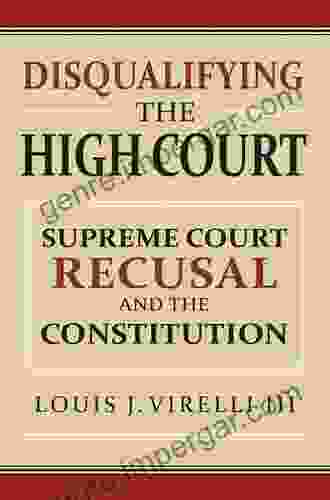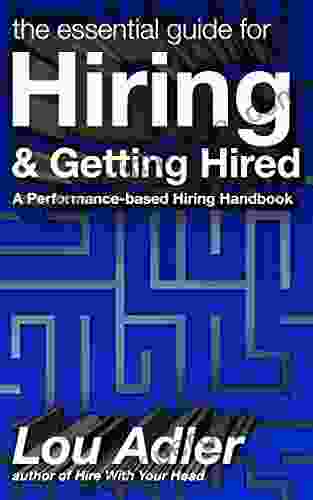Supreme Court Recusal: A Constitutional Imperative for Impartiality

The Supreme Court of the United States is the highest court in the land, tasked with interpreting the Constitution and upholding the rule of law. To guarantee fairness and impartiality in its decisions, the Court has established a set of ethical guidelines, including the principle of recusal. Recusal, or the voluntary withdrawal of a judge from a case, is an essential mechanism to ensure the absence of bias or the appearance of bias that could undermine the integrity and credibility of the Court.
The Constitutional Framework
The Constitution itself does not explicitly address the issue of judicial recusal. However, the Fifth Amendment's Due Process Clause prohibits the government from depriving any person of life, liberty, or property without due process of law. This has been interpreted to include the right to a fair and impartial trial. The Fourteenth Amendment, which applies the Due Process Clause to the states, extends this right to proceedings in all courts, including the Supreme Court.
The Canon of Judicial Ethics
In addition to the constitutional mandate for fairness, the Supreme Court has adopted a canon of judicial ethics, known as the Code of Conduct for United States Judges. Canon 2 of the Code requires judges to "avoid impropriety and the appearance of impropriety in all their activities." This includes recusing themselves from cases where their impartiality might reasonably be questioned.
4.7 out of 5
| Language | : | English |
| File size | : | 1893 KB |
| Text-to-Speech | : | Enabled |
| Screen Reader | : | Supported |
| Enhanced typesetting | : | Enabled |
| Word Wise | : | Enabled |
| Print length | : | 304 pages |
Grounds for Recusal
The Canon of Judicial Ethics identifies several grounds for recusal, including:
- Financial interest: A judge must recuse if they have any financial interest in the outcome of the case.
- Personal bias or prejudice: A judge must recuse if they have a personal bias or prejudice for or against a party or lawyer in the case.
- Prior involvement: A judge must recuse if they have previously been involved in the case as a lawyer or judge.
- Relationship to a party: A judge must recuse if they have a close relationship with a party to the case.
- Public perception of bias: A judge must recuse if there is a reasonable perception of bias that could undermine public confidence in the integrity of the Court.
Standards of Recusal
The standard for recusal is based on an objective test. The question is not whether the judge actually believes they are biased, but whether a reasonable person, aware of all the relevant facts, would have a well-founded doubt about the judge's impartiality.
Enforcement of Recusal
The Code of Judicial Ethics is self-enforcing. Judges are obligated to comply with the ethical guidelines, including the requirement for recusal. Failure to do so may subject a judge to disciplinary action, including removal from office.
Recent Controversies
The issue of Supreme Court recusal has been the subject of intense debate in recent years. Several high-profile cases have raised questions about the impartiality of certain justices due to their financial ties, political affiliations, and personal relationships. These controversies have highlighted the importance of recusal in maintaining public trust in the Supreme Court.
The principle of recusal is a cornerstone of the Supreme Court's commitment to impartiality and the rule of law. By voluntarily withdrawing from cases where their impartiality might be questioned, the justices ensure that the decisions of the Court are based on the law, not on personal bias or the appearance of bias. The Canon of Judicial Ethics provides a clear framework for recusal, and the standards of recusal are rigorously enforced. By adhering to these ethical guidelines, the Supreme Court upholds the public's confidence in its ability to dispense justice fairly and impartially.
Call to Action
For a comprehensive analysis of the constitutional, ethical, and practical implications of Supreme Court recusal, please consider reading the recently published book, "Supreme Court Recusal and the Constitution: Ensuring Impartiality in the Highest Court." This authoritative work delves into the history, principles, and controversies surrounding recusal, providing invaluable insights for legal professionals, scholars, and anyone interested in the functioning of the Supreme Court.
4.7 out of 5
| Language | : | English |
| File size | : | 1893 KB |
| Text-to-Speech | : | Enabled |
| Screen Reader | : | Supported |
| Enhanced typesetting | : | Enabled |
| Word Wise | : | Enabled |
| Print length | : | 304 pages |
Do you want to contribute by writing guest posts on this blog?
Please contact us and send us a resume of previous articles that you have written.
 Book
Book Novel
Novel Page
Page Chapter
Chapter Text
Text Story
Story Genre
Genre Reader
Reader Library
Library Paperback
Paperback E-book
E-book Magazine
Magazine Newspaper
Newspaper Paragraph
Paragraph Sentence
Sentence Bookmark
Bookmark Shelf
Shelf Glossary
Glossary Bibliography
Bibliography Foreword
Foreword Preface
Preface Synopsis
Synopsis Annotation
Annotation Footnote
Footnote Manuscript
Manuscript Scroll
Scroll Codex
Codex Tome
Tome Bestseller
Bestseller Classics
Classics Library card
Library card Narrative
Narrative Biography
Biography Autobiography
Autobiography Memoir
Memoir Reference
Reference Encyclopedia
Encyclopedia Ludovico Serra
Ludovico Serra Leslie R Crutchfield
Leslie R Crutchfield Michael E Wikan
Michael E Wikan Bernard Morris
Bernard Morris M Monir Madkour
M Monir Madkour Malcolm Coulthard
Malcolm Coulthard Louis N Irwin
Louis N Irwin Lisa D Hinz
Lisa D Hinz Shelley Klein
Shelley Klein Lynn Helena Caporale
Lynn Helena Caporale Lucy Bellamy
Lucy Bellamy Robert G Jahn
Robert G Jahn Lusijah S Darrow
Lusijah S Darrow Lissa Alexander
Lissa Alexander Radu Cinamar
Radu Cinamar Lingo Mastery
Lingo Mastery Lisa Sattenspiel
Lisa Sattenspiel Leslie Leyland Fields
Leslie Leyland Fields Gregory J Noonan
Gregory J Noonan M J Lewis
M J Lewis
Light bulbAdvertise smarter! Our strategic ad space ensures maximum exposure. Reserve your spot today!

 Desmond FosterUnveiling the Genesis of NASA: An Exploration of "An Administrative History...
Desmond FosterUnveiling the Genesis of NASA: An Exploration of "An Administrative History...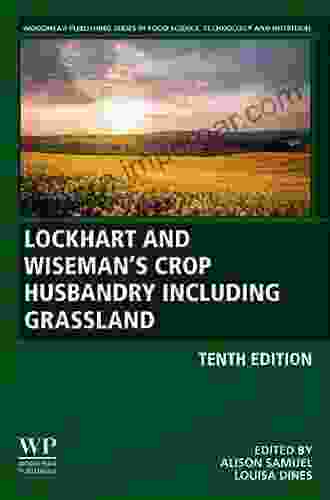
 Harold PowellLockhart and Wiseman's Crop Husbandry Including Grassland: Your Essential...
Harold PowellLockhart and Wiseman's Crop Husbandry Including Grassland: Your Essential... Bryce FosterFollow ·8.2k
Bryce FosterFollow ·8.2k Cole PowellFollow ·5.6k
Cole PowellFollow ·5.6k John Dos PassosFollow ·3k
John Dos PassosFollow ·3k Nick TurnerFollow ·3.4k
Nick TurnerFollow ·3.4k Cameron ReedFollow ·13.7k
Cameron ReedFollow ·13.7k Francisco CoxFollow ·19.9k
Francisco CoxFollow ·19.9k Darnell MitchellFollow ·8.7k
Darnell MitchellFollow ·8.7k Harold PowellFollow ·17.1k
Harold PowellFollow ·17.1k

 J.D. Salinger
J.D. SalingerThe Montefeltro Conspiracy Renaissance Mystery Decoded
In the heart of the Italian Renaissance, a...

 Ryūnosuke Akutagawa
Ryūnosuke AkutagawaElan Vital Magazine: A Literary Sanctuary for the Mind...
In this fast-paced digital age, where...
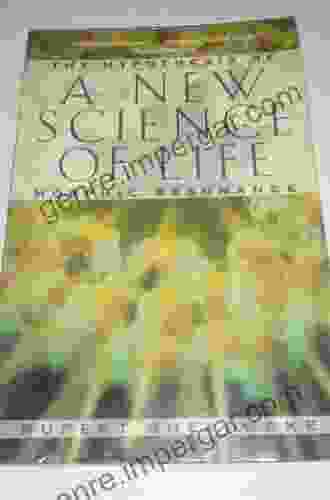
 Derek Bell
Derek BellCode Biology: Unveiling the New Science of Life
Every living organism, from...
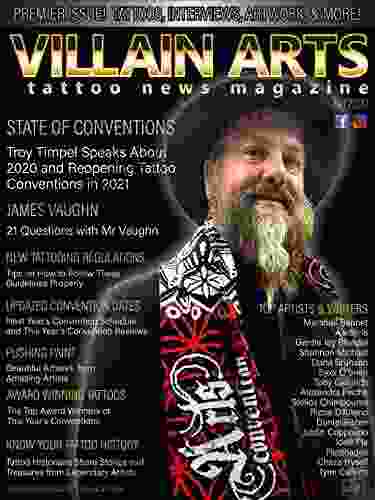
 Rick Nelson
Rick NelsonUnleash the Darkness: Dive into the World of Villain Arts...
Prepare to be...
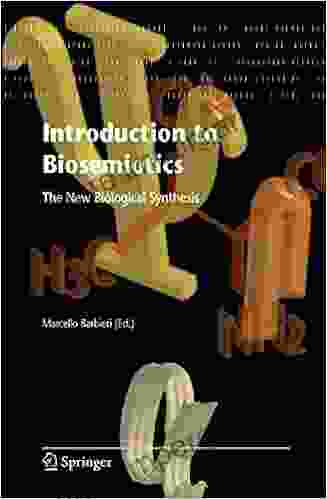
 Tony Carter
Tony CarterEmbark on a Scientific Odyssey: Unveil the Secrets of...
In an era where environmental concerns...
4.7 out of 5
| Language | : | English |
| File size | : | 1893 KB |
| Text-to-Speech | : | Enabled |
| Screen Reader | : | Supported |
| Enhanced typesetting | : | Enabled |
| Word Wise | : | Enabled |
| Print length | : | 304 pages |


